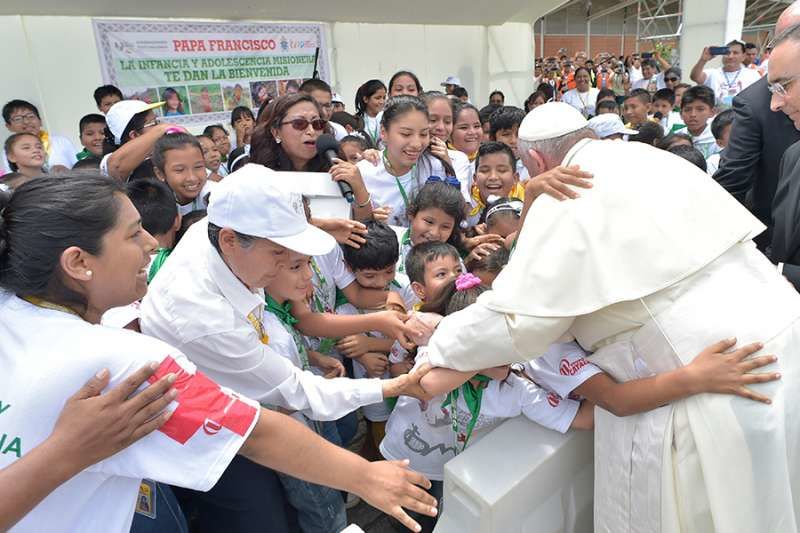Pope Francis visited one of Peru's most biodiverse regions Friday, telling its inhabitants that while remote, their land is not forgotten and must be cared for.
He also stressed the importance of fighting such scourges as corruption and human trafficking.
“'We are not a no man’s land.' It is something that needs to be emphasized. You are not a no man’s land. This land has names. It has faces. It has you,” the Pope said Jan. 19 to the people of Puerto Maldonado, the capital of the Madre de Dios Region in the Amazon basin.
He was responding to comment made by a local couple, Margarita Martínez N√∫√±ez Valer and her husband Arturo, who while sharing their testimony said their land is one “that is mostly forgotten, wounded and marginalized...but we are not a no man’s land.”
Pope Francis noted that Mary also came from Nazareth, a remote and isolated village that many also considered “a no man’s land.”
Mary, he said, is not only an example but a mother, and when we have a mother, “we don’t have that terrible feeling of belonging to no one, that takes hold when our sense of belonging to a family, to a people, to a land, to our God, begins to fade.”
The Madre de Dios Region, then, “is not a land of orphans, but a land that has a Mother! And if it has a mother, it has sons and daughters, a family, a community.” While the problems might not disappear, when there is a mother, a family and a community “we certainly find the strength to confront them differently.”
He visited Puerto Maldonado on the first full day of his Jan. 18-21 visit to Peru, after spending three days in Chile. The Amazonian region is of special interest to the Pope, considering his 2015 encyclical on care for our common home, Laudato si', and his decision to hold a Pan-Amazonian synod in 2019 to discuss the challenges the area faces.
Before meeting with the inhabitants of Puerto Maldonado, he met with members of the Amazonian community, and distributed copies of Laudato si' which had been translated into the local languages.
Held in the city's Jorge Basadre Institute, the encounter with the people of Puerto Maldonado began with a greeting from Bishop David Martinez de Aguirre Guinea, Vicar Apostolic of Puerto Maldonado, and the testimony of a catechist.
Francis said it is painful for him to see how some people seek to exploit the territory and therefore make Madre de Dios “a nameless land, without children, a barren land.”
Referring to what he has often dubbed the “throwaway culture,” he said this is a mentality which isn't satisfied with simple exclusion, but continues to advance “by silencing, ignoring and throwing out everything that does not serve its interests; as if the alienating consumerism of some is completely unaware of the desperate suffering of others.”
“It is an anonymous culture, without bonds, without faces,” and which only wants to consume, he said, adding that both land and people are treated according to the same logic: “forests, rivers and streams are exploited mercilessly, then left barren and unusable,” while people are “used until someone gets tired of them, then abandoned.”
He then spoke out against the temptation of corruption and the practice of human trafficking, saying forcefully that the term slavery should be used instead: “We have become accustomed to using the term 'human trafficking', but in truth we should speak of slavery: slavery for work, sexual slavery, slavery for profit.”
“It is painful to see how in this land … so many women are devalued, denigrated and exposed to endless violence. Violence against women cannot be treated as 'normal', maintaining a culture of machismo blind to the leading role that women play in our communities. It is not right for us to look the other way and let the dignity of so many women, especially young women, be trampled upon.”
He noted that many people, desperate to escape poverty, come to the area to work in the gold mines, but he cautioned that gold can quickly turn into “a false god that demands human sacrifices.”
“False gods, the idols of avarice, money and power, corrupt everything. They corrupt people and institutions, and they ruin the forest,” he said, adding that Christ called these “demons that require much prayer to expel.”
The Pope then urged the community to continue forming movements and organizations aimed at overcoming the plagues of corruption and trafficking. “I likewise encourage you to gather, as people of faith and vibrant ecclesial communities, around the person of Jesus,” he said.
“Through heartfelt prayer and hope-filled encounter with Christ, we will be able to attain the conversion that leads us to true life. Jesus promised us true life, authentic life, eternal life. Not a make-believe life, like the one offered by all those dazzling false promises; they promise life but lead us to death.”
Salvation, he said, “is not something generic or abstract. Our Father looks at real people, with real faces and histories. Every Christian community must be a reflection of this gaze, this presence that creates bonds and generates family and community. It is a way of making visible the kingdom of heaven, in communities where everyone feels a part of the whole, where they feel called by name and encouraged to be a builder of life for others.”
Pope Francis closes his speech telling the people they live in one of “the most exuberant explosions of life on our planet,” and urged them love the land and to “realize that it belongs to you. Breathe it in, listen to it, marvel at it.”
“Fall in love with this land called 'Madre de Dios,' commit yourself to it and care for it,” he said, and “do not use this land as a mere disposable object, but as a genuine treasure to be enjoyed, cultivated and entrusted to your children.”

